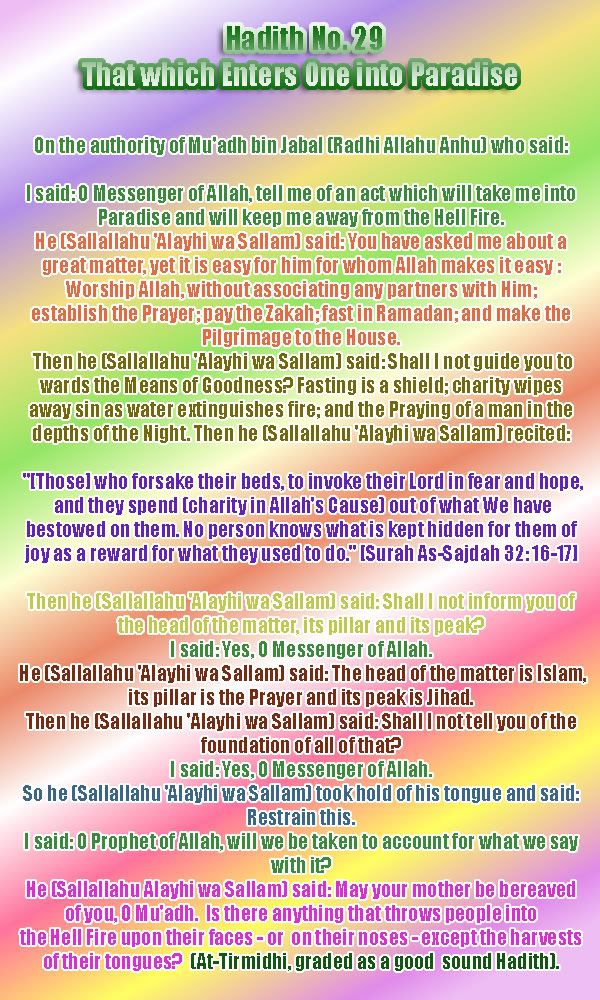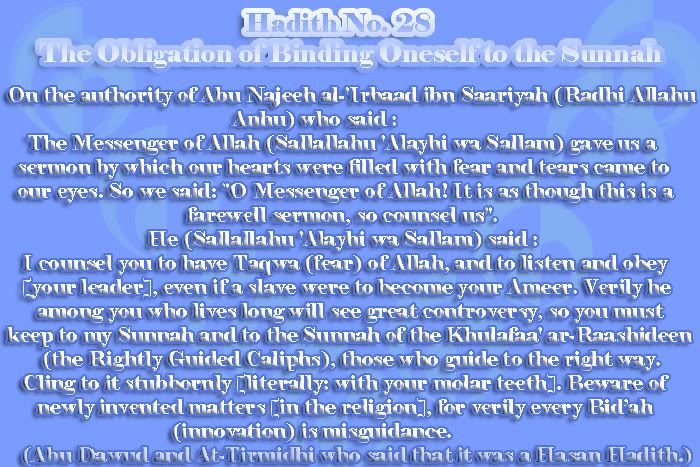
http://www.islaam.net/main/display.php?id=220&category=24
Explanation of Hadeeth Number 30
His (sallAllaahu alayhi wa sallam) statement "has laid down" means that Allaah 'azza wa jall has made these things obligatory. And his statement "so do not overstep them" means do not enter into them. And as for the forbiddance from delving into those matters which Allaah has remained silent about, then it is in accordance with his (sallAllaahu alayhi wa sallam) statement: "Do not ask me about that which I have left [unspecified], for the earlier nations were destroyed because of their excessive questioning and their disagreeing with their Prophets" [See Hadeeth Number 9]. Some of the 'ulamaa have said: "The Banoo Israa'eel used to ask [much] and they were answered and given what they asked for, until this became a fitnah (trial) for them, and this brought them towards their destruction."
And the Sahaabah (radiAllaahu 'anhum) understood this, and restrained from asking except in those matters which were essential. [Due to this] they would be delighted when a desert bedouin [who would not be so restrained] would come to ask the Messenger of Allaah (sallAllaahu alayhi wa sallam) questions, so they would listen attentively.
And some people became extreme in this until they said: "It is not permissible to ask the scholars about new events/situations until they actually occur." And the Salaf [ie the Early Scholars] used to say similar to this, that is to leave such matters until they actually occurred. [This continued] until they began to fear that Knowledge would be lost [through the death of the 'ulamaa], and so they began to lay down Principles, and discuss finer issues, and to arrange and write down the different branches of Knowledge and their rulings.
And the 'ulamaa have differed regarding the ruling on matters before the Sharee'ah was revealed about them [ie during the life of the Prophet sallAllaahu alayhi wa sallam] - were they all forbidden or permissible or was there no ruling about them at all? So the 'ulamaa have split into three madhhabs on this issue, and all this is mentioned in detail in the books of Usool ul-Fiqh.
Summary
Explanation of Hadeeth Number 30
His (sallAllaahu alayhi wa sallam) statement "has laid down" means that Allaah 'azza wa jall has made these things obligatory. And his statement "so do not overstep them" means do not enter into them. And as for the forbiddance from delving into those matters which Allaah has remained silent about, then it is in accordance with his (sallAllaahu alayhi wa sallam) statement: "Do not ask me about that which I have left [unspecified], for the earlier nations were destroyed because of their excessive questioning and their disagreeing with their Prophets" [See Hadeeth Number 9]. Some of the 'ulamaa have said: "The Banoo Israa'eel used to ask [much] and they were answered and given what they asked for, until this became a fitnah (trial) for them, and this brought them towards their destruction."
And the Sahaabah (radiAllaahu 'anhum) understood this, and restrained from asking except in those matters which were essential. [Due to this] they would be delighted when a desert bedouin [who would not be so restrained] would come to ask the Messenger of Allaah (sallAllaahu alayhi wa sallam) questions, so they would listen attentively.
And some people became extreme in this until they said: "It is not permissible to ask the scholars about new events/situations until they actually occur." And the Salaf [ie the Early Scholars] used to say similar to this, that is to leave such matters until they actually occurred. [This continued] until they began to fear that Knowledge would be lost [through the death of the 'ulamaa], and so they began to lay down Principles, and discuss finer issues, and to arrange and write down the different branches of Knowledge and their rulings.
And the 'ulamaa have differed regarding the ruling on matters before the Sharee'ah was revealed about them [ie during the life of the Prophet sallAllaahu alayhi wa sallam] - were they all forbidden or permissible or was there no ruling about them at all? So the 'ulamaa have split into three madhhabs on this issue, and all this is mentioned in detail in the books of Usool ul-Fiqh.
Summary
1. That a Muslim has specified enjoined duties to perform in his religion, which he cannot neglect
2. That Allaah has shown us how and where not to commit excesses
3. That He has set limits and prohibitions, which also cannot be neglected
4. That what is known clearly from the Book and the Sunnah is enough for our lives, and this is a Mercy from Allaah
5. That we should not seek after what has not been mentioned
6. That speculating, philosophizing and hypothesizing about Islaam is forbidden
7. That Allaah never forgets
*~*~*~*~*~*~*~*~*~*~*
http://fortyhadith.iiu.edu.my/hadith30.htm
Background
This hadith has been recorded by a number of scholars. They all recorded this hadith through the chain of Dawood Ibn Abi Hind on the authority of Makhool from Abi Tha'labah Al-Khushani. This hadith is regarded as a weak hadith by many scholars such as Al-Bukhari, Ahmad and Hatem. They point out that there are three defects in this hadith:
1. Makhool did not hear the hadith from Abi Tha'labah.
2. Even if it is assumed that he did hear from Abi Tha'labah, Makhool was classified among the third category of those who commit tadlis (tadlis is when a person narrates a hadith upon one of his teachers but he did not hear the particular hadith he is narrating directly from his teacher but from an intermediate source). For this hadith, there should be a direct term that reflects sama', that is this person heard the hadith directly from his teacher or sheikh. Otherwise, if he uses on the authority of, this cannot be accepted.
3. It is debatable whether this is actually a hadith or a saying of one of the Companions (sahabi). (Is it marfou' or mawqouf?)
Despite these three defects, the hadith has been accepted. Moreover, what has been mentioned in this hadith has been used by all jurists or fuqaha' as a way of categorizing rulings of shari'ah. It is from this hadith that the rules of the five well-known categorizations are derived: The obligatory (wajib), preferable (mandoub), forbidden (muharam), hateful (makrouh), and the permissible (mubah). Not only is the meaning acceptable, this hadith is also used for categorizing rulings of shari'ah (ahkam).
Lessons
The meaning of the statement which says: "He (Allah the Almighty) has set certain limits, so do not go beyond them." has been emphasized in the Qur'an. Allah says: These are the bounds, the limits set by Allah. Do not then transgress them for who transgress them are evil doers. [Surah Al-Baqarah (2): Ayah 229], and in Surah Al-Talq, Ayah 1, Allah says: And those are the set limits of Allah and whosoever transgresses the set limits of Allah then he indeed has wronged himself.
By looking closer into the content of these verses, we find that the two verses are talking about the limits (hudud) that Allah set regarding family relationships, especially the relationship between husband and wife. The limits that govern the relationship between husband and wife are stated in two verses in two surahs. Moreover, in Surah Al-Nisa', Ayah 13 and 14, Allah talks about the regulations of inheritance (furud almirath). Favoring one person over another and giving a person more than he deserves is considered transgression in Islam. And if we lessen or decrease the right of another person, this is also considered transgression. We have to stick to what Allah has set for us regarding what a person should receive.
Usually in family relationships, if there is no adherence to the Islamic bounds and guidelines, the consequences will inevitably be negative as we see in real life and in the Muslim world today. If we go to the courts we will see many cases where transgression has taken place. If the family life is not carried out in accordance with shari'ah, we will end up with many people transgressing the set limits. For example, the way divorce takes place violates the concept of family relationship where the spouses are not aware of what they say. They are not in control of their tempers. They end up saying things they do not mean (e.g. performing talaq out of anger) - things which might get them in a situation where they would need to go and consult the court or scholars regarding what to do. They start to look for a way to resolve the problem only when they are stuck and the situation deteriorates. Had they controlled their tempers and their tongues in the first place, they would not have reached this situation. It is only because they have violated the prescribed limits. (In the example of a husband having used words or terms which later on even he himself is not sure whether he has declared divorce or not, some scholars will refer it to the intention when the action took place.)
Another area in this regard is the area of the procedure of divorce itself that has been set by Allah. There are certain rulings that have to be observed by both parties, especially the husband. There are ways of minimizing the case of divorce. It has to occur in a totally controlled situation and in a way where there is an opportunity of getting back when it is carried out in the right way. There are adab (manners) that have to be followed if divorce has to take place. Most of the time divorce takes place when everybody loses control of their tempers, feelings or emotions. In Islam, if Muslims have to divorce, they are required to be fully aware of the situation and consequences, and that they have thought deeply about it and not simply divorce as a result of anger or a hasty decision.
Islam creates the procedure that if a person is actually considering divorce, he must be fully aware of what he is doing and his actions are based on sound reasons. This also means that both sides have given the act of divorce deep thought and they could not find any other solution to their dispute. The act of divorce should not lead to transgression - the wife and children should not be victims. To make sure of this, we should stick to the limits set by Allah. People have to be aware of this. They have to respect the family relationship. There should be strong commitment where both sides stick to what this commitment implies. This is so because Islam encourages the continuity of relationships. So here we have two considerations: (1) the respect of commitment, and (2) the continuity of that commitment.
Islam, as a practical religion, wants things to happen even if we dislike them. This is actually mentioned about the relationship between husband and wife. The hadith explains what the verse in the Qur'an says, that the believer should not hate another believer (wife). If he dislikes an aspect of her character or personality, he should appreciate other aspects of her character as well and vice versa. This is because there is no perfect person except Prophet Muhammad, sallallahu 'alayhi wasallam. Consequently, Islam encourages us to appreciate other people's characters.
Islam also asks us to be moderate in our life when it comes to dealing with people. So spouses should deal with each other in a moderate way. A hadith says: "When you like someone, you should like him moderately because he might become someone whom you dislike one day, and when you dislike someone dislike him moderately because he might become someone you like one day."
This hadith implies that we should be moderate in our actions and sayings and not to exceed the limits. Unfortunately today, this idea has been violated by the media through movies, songs, etc. where love is taken as the central issue in our daily lives. We rarely or never see any exception where love is moderate and in accordance with the Islamic guidelines. This explains why we have 'hopeless' people. Because they have lost their lovers (and most importantly because they have exceeded the limits set by Allah) their lives become miserable and meaningless. This is because of the effect of the culture and the environment which they are exposed to. So by exceeding the limits set by Allah, more problems and disasters occur.
Another area where people usually go beyond the limits is the area of fara'ed (inheritance). The limits and guidelines that have been set by Allah have been violated. Allah, in the Qur'an, and the Prophet, sallallahu 'alayhi wasallam, via revelation, have prescribed and made clear for us the limits. For example, in the case of death, it is made clear to us who should inherit and what is the allowance of each son or daughter. As a result we will have those who have priority and those who have less but still have their share. And we also have those who are even set aside because there is someone closer to inherit. They are considered mahjoub.
Nowadays we see people violate these limits all over the Muslim world. Most of the cases happen because of the transgression and domination of the relatives. Muslims all over the world have to observe the limits. Otherwise they will transgress and violate the guidelines set by Allah. (They have to make sure that this is not halal and will not please Allah?). They may enjoy it for months or years, but at the end they may suffer the severe punishment of Allah in the Hereafter. We hear different stories of people who transgress and victimize their relatives. A verse in the Qur'an says: Those people are considered transgressors and being unjust where Allah has forbidden injustice (zulm). These people will be totally responsible for what they have done. This is one statement that is mentioned in this hadith and has been emphasized by the Qur'an.
Conclusion
All the meanings that are mentioned in this hadith are sound and acceptable even if the hadith itself - due to chain defect in the way it is narrated - is considered weak. A Maliki jurist Ibn Al'arabi said: "This hadith is one of the most important rulings in Islam and should be known to every Muslim."
Background
This hadith has been recorded by a number of scholars. They all recorded this hadith through the chain of Dawood Ibn Abi Hind on the authority of Makhool from Abi Tha'labah Al-Khushani. This hadith is regarded as a weak hadith by many scholars such as Al-Bukhari, Ahmad and Hatem. They point out that there are three defects in this hadith:
1. Makhool did not hear the hadith from Abi Tha'labah.
2. Even if it is assumed that he did hear from Abi Tha'labah, Makhool was classified among the third category of those who commit tadlis (tadlis is when a person narrates a hadith upon one of his teachers but he did not hear the particular hadith he is narrating directly from his teacher but from an intermediate source). For this hadith, there should be a direct term that reflects sama', that is this person heard the hadith directly from his teacher or sheikh. Otherwise, if he uses on the authority of, this cannot be accepted.
3. It is debatable whether this is actually a hadith or a saying of one of the Companions (sahabi). (Is it marfou' or mawqouf?)
Despite these three defects, the hadith has been accepted. Moreover, what has been mentioned in this hadith has been used by all jurists or fuqaha' as a way of categorizing rulings of shari'ah. It is from this hadith that the rules of the five well-known categorizations are derived: The obligatory (wajib), preferable (mandoub), forbidden (muharam), hateful (makrouh), and the permissible (mubah). Not only is the meaning acceptable, this hadith is also used for categorizing rulings of shari'ah (ahkam).
Lessons
The meaning of the statement which says: "He (Allah the Almighty) has set certain limits, so do not go beyond them." has been emphasized in the Qur'an. Allah says: These are the bounds, the limits set by Allah. Do not then transgress them for who transgress them are evil doers. [Surah Al-Baqarah (2): Ayah 229], and in Surah Al-Talq, Ayah 1, Allah says: And those are the set limits of Allah and whosoever transgresses the set limits of Allah then he indeed has wronged himself.
By looking closer into the content of these verses, we find that the two verses are talking about the limits (hudud) that Allah set regarding family relationships, especially the relationship between husband and wife. The limits that govern the relationship between husband and wife are stated in two verses in two surahs. Moreover, in Surah Al-Nisa', Ayah 13 and 14, Allah talks about the regulations of inheritance (furud almirath). Favoring one person over another and giving a person more than he deserves is considered transgression in Islam. And if we lessen or decrease the right of another person, this is also considered transgression. We have to stick to what Allah has set for us regarding what a person should receive.
Usually in family relationships, if there is no adherence to the Islamic bounds and guidelines, the consequences will inevitably be negative as we see in real life and in the Muslim world today. If we go to the courts we will see many cases where transgression has taken place. If the family life is not carried out in accordance with shari'ah, we will end up with many people transgressing the set limits. For example, the way divorce takes place violates the concept of family relationship where the spouses are not aware of what they say. They are not in control of their tempers. They end up saying things they do not mean (e.g. performing talaq out of anger) - things which might get them in a situation where they would need to go and consult the court or scholars regarding what to do. They start to look for a way to resolve the problem only when they are stuck and the situation deteriorates. Had they controlled their tempers and their tongues in the first place, they would not have reached this situation. It is only because they have violated the prescribed limits. (In the example of a husband having used words or terms which later on even he himself is not sure whether he has declared divorce or not, some scholars will refer it to the intention when the action took place.)
Another area in this regard is the area of the procedure of divorce itself that has been set by Allah. There are certain rulings that have to be observed by both parties, especially the husband. There are ways of minimizing the case of divorce. It has to occur in a totally controlled situation and in a way where there is an opportunity of getting back when it is carried out in the right way. There are adab (manners) that have to be followed if divorce has to take place. Most of the time divorce takes place when everybody loses control of their tempers, feelings or emotions. In Islam, if Muslims have to divorce, they are required to be fully aware of the situation and consequences, and that they have thought deeply about it and not simply divorce as a result of anger or a hasty decision.
Islam creates the procedure that if a person is actually considering divorce, he must be fully aware of what he is doing and his actions are based on sound reasons. This also means that both sides have given the act of divorce deep thought and they could not find any other solution to their dispute. The act of divorce should not lead to transgression - the wife and children should not be victims. To make sure of this, we should stick to the limits set by Allah. People have to be aware of this. They have to respect the family relationship. There should be strong commitment where both sides stick to what this commitment implies. This is so because Islam encourages the continuity of relationships. So here we have two considerations: (1) the respect of commitment, and (2) the continuity of that commitment.
Islam, as a practical religion, wants things to happen even if we dislike them. This is actually mentioned about the relationship between husband and wife. The hadith explains what the verse in the Qur'an says, that the believer should not hate another believer (wife). If he dislikes an aspect of her character or personality, he should appreciate other aspects of her character as well and vice versa. This is because there is no perfect person except Prophet Muhammad, sallallahu 'alayhi wasallam. Consequently, Islam encourages us to appreciate other people's characters.
Islam also asks us to be moderate in our life when it comes to dealing with people. So spouses should deal with each other in a moderate way. A hadith says: "When you like someone, you should like him moderately because he might become someone whom you dislike one day, and when you dislike someone dislike him moderately because he might become someone you like one day."
This hadith implies that we should be moderate in our actions and sayings and not to exceed the limits. Unfortunately today, this idea has been violated by the media through movies, songs, etc. where love is taken as the central issue in our daily lives. We rarely or never see any exception where love is moderate and in accordance with the Islamic guidelines. This explains why we have 'hopeless' people. Because they have lost their lovers (and most importantly because they have exceeded the limits set by Allah) their lives become miserable and meaningless. This is because of the effect of the culture and the environment which they are exposed to. So by exceeding the limits set by Allah, more problems and disasters occur.
Another area where people usually go beyond the limits is the area of fara'ed (inheritance). The limits and guidelines that have been set by Allah have been violated. Allah, in the Qur'an, and the Prophet, sallallahu 'alayhi wasallam, via revelation, have prescribed and made clear for us the limits. For example, in the case of death, it is made clear to us who should inherit and what is the allowance of each son or daughter. As a result we will have those who have priority and those who have less but still have their share. And we also have those who are even set aside because there is someone closer to inherit. They are considered mahjoub.
Nowadays we see people violate these limits all over the Muslim world. Most of the cases happen because of the transgression and domination of the relatives. Muslims all over the world have to observe the limits. Otherwise they will transgress and violate the guidelines set by Allah. (They have to make sure that this is not halal and will not please Allah?). They may enjoy it for months or years, but at the end they may suffer the severe punishment of Allah in the Hereafter. We hear different stories of people who transgress and victimize their relatives. A verse in the Qur'an says: Those people are considered transgressors and being unjust where Allah has forbidden injustice (zulm). These people will be totally responsible for what they have done. This is one statement that is mentioned in this hadith and has been emphasized by the Qur'an.
Conclusion
All the meanings that are mentioned in this hadith are sound and acceptable even if the hadith itself - due to chain defect in the way it is narrated - is considered weak. A Maliki jurist Ibn Al'arabi said: "This hadith is one of the most important rulings in Islam and should be known to every Muslim."


